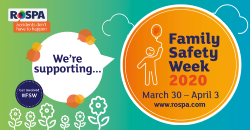30th March 2020

The Southern Health and Social Care Trust is supporting Family Safety Week as we are all limiting the amount of time spent outdoors.
During the coronavirus pandemic, when families are spending much more time at home, it is of greatest importance that we are extra vigilant and to remember that accidents in the home are preventable when the correct measures are in place.
To be aware of the risks that would heighten the chances of any harm coming to our young children one should according to The Royal Society of Prevention for Accidents (ROSPA) “look at your home from your child’s point of view”.
Get down on your hands and knees and explore the world from the same level as your child. From here you can identify what might be a risk to their safety, for example sharp edges, dangling cords, cleaning products, cups with hot liquids etc. You can then take simple steps to move things out of reach or make secure.
It is of key importance at this time that our children are kept away from healthcare settings, especially our Accident and Emergency departments to keep them and everyone in their family safe from exposure to the coronavirus and not least so that our healthcare workers can concentrate on dealing with the virus.
Gerard Rocks Assistant Director, Promoting Wellbeing Division, said: “Families are juggling so much, often in confined space during the COVID-19 pandemic. Whilst everyone is doing their utmost to provide schooling, childcare and very often continue to work, the risks in terms of home safety are heightened.”
Please find outlined below top tips for peace of mind:
- Safer bath times require a non-slip mat to help prevent a fall in the bath. Cold water should be run into the bath first and topped up with hot water. Always check the temperature before putting your child into the bath using your elbow. Keep cleaning products in a high cabinet with a safety lock to prevent poisoning and stay within reach of your child when they are in the bath.
- To keep under 5’s safe at bedtime it is important to have safe bedtime habits. Under 5’s should sleep alone in their cot or bed and should not share the same bed as their parents. Co-sleeping has been linked to an increased risk of cot Sudden Infant Death Syndrome, especially if parents smoke or have been drinking alcohol. Also keep cots and beds clutter free. If your bedrooms are upstairs, keep children under the age of two years off the stairs. Fit stair gates securely to both the top and bottom of stairs. Fit upstairs windows with window restrictors and refrain from putting furniture underneath windows. This will prevent the risk of falls from a height. Where windows are fitted with blinds ensure looped cords are kept out of reach and cord tidies or cleat hooks are fitted in order to prevent strangulation.
- Our little ones should be encouraged to be inquisitive and to explore during playtime in a safe and controlled way. Playtime needs to be safe and supervised. Toys with small parts are meant for older children and are a choking hazard for under 5’s. Adhere to the age guidance on toys and ensure all toys are marked with the British Standards Institute Kitemark and CE marking which indicates conformity with health, safety and environmental protection standards. Keep toys tidied away after use to avoid trips and falls and ensure all battery compartments on toys are sufficiently secured to prevent children opening these. Button batteries cause significant and lasting damage to health if ingested. If ingested bring your child to hospital Accident and Emergency Department immediately. Likewise, if children are playing outdoors, hazardous chemicals should be kept out of reach and under lock and key. Take extra care where your home is near a busy or fast-moving road, and if necessary, keep doors locked to keep little explorers from wandering outside unaccompanied.
- To keep under 5’s safe at mealtimes they should always be supervised. Their food should be cut into small and manageable pieces to reduce the risk of choking. Hot drinks should always be kept out of reach and should not be drank when holding a baby or toddler. To avoid accidents, keep children out of the kitchen when preparing meals. Kettles and coffee making machines should be kept well pushed back on kitchen worktops and saucepan handles turned in towards the back of cookers
Some other top tips include: - Keep nappy sacks out of reach to avoid suffocation risk
- Change nappies on the floor to avoid the risk of falls from a height
- Secure furniture to the wall with furniture straps and flat screened televisons with TV straps to prevent injury from heavy weights.
For further guidance or advice visit the ROSPA ‘Keeping Kids Safe Parents’ Hub’ at https://www.rospa.com/Campaigns-Fundraising/Family-Safety-Week or follow ROSPA throughout family safety week on Facebook, Twitter and Instagram.
Parents can download the British RedCross Baby and Child First Aid Course onto their SMART devices in order to be able to cope with accidents should they occur in the home.




